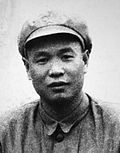
This article lists the modern political leaders of Tibet within the People's Republic of China. The transition from Lamaist rule in Tibet started in 1951 with the Seventeen Point Agreement between the Central People's Government and the 14th Dalai Lama. A "Preparatory Committee for the Autonomous Region of Tibet" (PCART) was established in 1956 in the former Tibet Area to create a parallel system of administration along Communist lines. Transition to secular government completed when Tibet Autonomous Region was officially founded in 1965 according to the national autonomy law. [1]
Contents
- TAR Government Chairmen
- CCP TAR Committee Secretaries
- TAR People's Congress Standing Committee Chairmen
- CPPCC TAR Committee Chairmen
- See also
- References
The politics in Tibet are structured in a dual party-government system like all other governing institutions in the People's Republic of China. Both the Chairman of the Tibet Autonomous Region and the chairman of the regional People's Congress, are by law ethnic Tibetans. There is also a branch secretary of the Chinese Communist Party (CCP), who is the top executive official.










